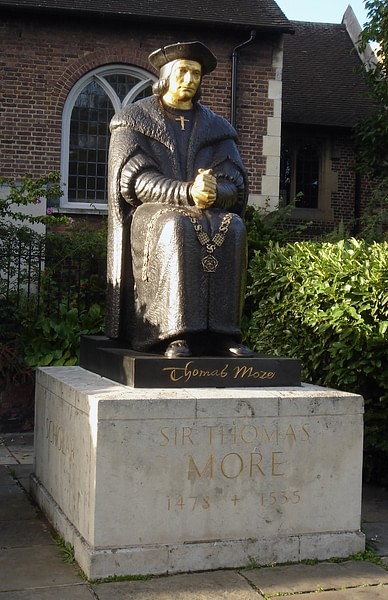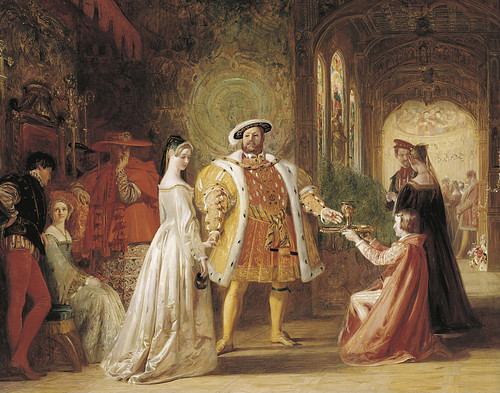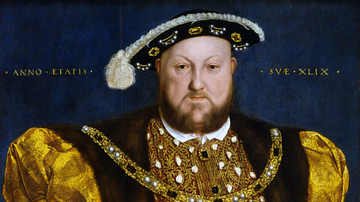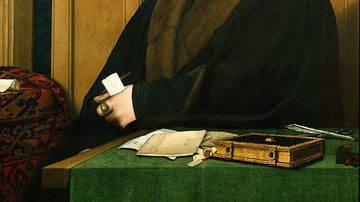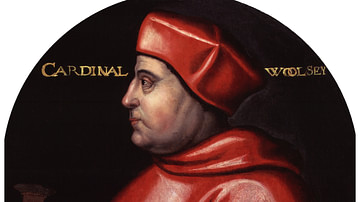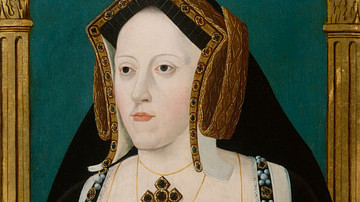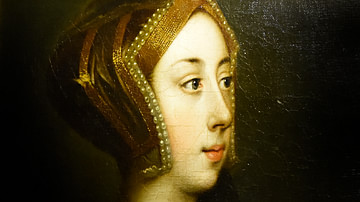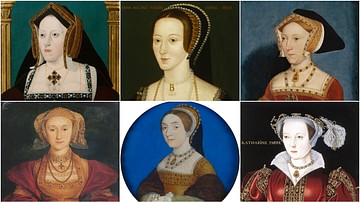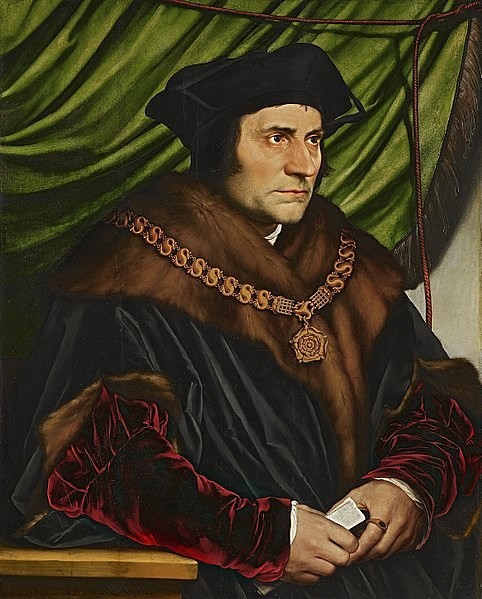
Sir Thomas More (1478-1535 CE) was a lawyer, scholar, statesman, and Lord Chancellor to Henry VIII of England (r. 1509-1547 CE) who was executed in July 1535 CE for his refusal to endorse Henry's break of the Church in England from the Catholic Church in Rome.
The highly principled More also disagreed with the king's divorce from his first wife Catherine of Aragon (1485-1536 CE) and especially Henry's promotion of himself as head of the Church of England instead of the Pope. Prior to his time in politics, Thomas More was a celebrated author and scholar, his most famous work today being Utopia which includes a philosophical description of an ideal society set on an island. Thomas More was made a saint in 1935 CE by the Catholic Church.
Early Career & Writings
Thomas More was born in London in 1478 CE, his father being the lawyer Sir John More. The young Thomas was educated at Saint Anthony's school in the capital while as a teenager he worked as a page at the house of Archbishop John Morton. He graduated from Oxford University in 1496 CE and went on to study law at Lincoln's Inn. More spent four years in a Carthusian monastery but decided not to take his vows and fully join the priesthood.
In 1504 CE More began his 30-year political career and entered Parliament. The next year he met the famed scholar Desiderius Erasmus whose humanist philosophy would influence Thomas' own work. More became the under-sheriff of London in 1510 CE, but he suffered the tragedy of his first wife's death during childbirth in 1511 CE. His career continued apace, though, with his appointment as Master of Requests in 1514 CE and his participation in a royal trade delegation to Flanders in 1515 CE.
Utopia
It was More's writings that gained him most fame at this point in his career. Indeed, More rose to prominence as a scholar with a European-wide reputation. Works by More include Dialogue Concerning Heresies, Responsio ad Lutherum, Supplication for Souls, and an unfinished but influential (and somewhat biased) History of King Richard III. His most famous work, then and today, is Utopia, published in 1516 CE, which describes an ideal state located on an imaginary island somewhere beyond the equator which has been cut off from Europe for 1,200 years. The work is not a purely philosophical examination of how to organise a political state, though, as the chief character, Raphael Hythloday reflects on the tricks European kings get up to such as fiddling finances and taxing the people for wars that never materialise, criticisms aimed at both Henry VII of England (r. 1485-1509 CE) and Henry VIII. Rather than a discussion of what makes a perfect society, then, the work was really intended as a devastating criticism of how far Tudor England was from any such ideal. The book closes with Hythloday and his interlocutor Morus (More himself) agreeing that Utopia (which means 'no place') is unlikely to ever exist anywhere other than on the island of the Utopians.
It is somewhat, ironic, then, that the part of Utopia which presents an impossible ideal, that is a perfectly just and happy society, has had the most lasting legacy. Utopia and its radical ideas of abolishing private property, money, and private life so that people could concentrate on the common good, and the holding of all the community's resources as a 'commonwealth' to all (just as the earliest Christians had done), has inspired many later philosophers and political systems. This is despite the fact that More intended the island of Utopia to function only as a satirical mirror in which real contemporary society might be more clearly judged and so reform be contemplated by its leaders.
Lord Chancellor
Henry VIII, who himself had displayed an interest in literature and ecclesiastical scholarship, befriended More and invited him to his court. The king made More a diplomat and personal advisor, inviting him to join the King's Council in 1518 CE. The king knighted More in 1521 CE and made him Treasurer of the Exchequer. In 1523 CE he was appointed Speaker of the House of Commons, and his tenure very likely saw the first use of the members' privilege to speak completely freely in the House without fear of reprisal, legal or otherwise. Henry and Thomas even worked together on their rejection of Luther and Protestantism in the Defence of the Seven Sacraments. In 1525 CE More was made Chancellor of the Duchy of Lancaster.
A man of strict principle, More's political career stalled somewhat when it became necessary to involve himself in the shadier dealings of court politics. Nevertheless, the king must have appreciated his honesty for he made More Lord Chancellor in 1529 CE. In this position, the most powerful minister in the land, Thomas succeeded Cardinal Wolsey, Archbishop of York (l. c. 1473-1530 CE). Wolsey had fallen out of favour because of the lack of progress in the king's 'great matter' - his attempt to divorce his first wife Catherine of Aragon so that he might marry his second, Anne Boleyn (c. 1501-1536 CE). Wolsey was to be tried for treason but died from ill health in 1530 CE before his case was presented. Thomas More thus became chancellor, a position he would hold until 1532 CE, the very pinnacle of his career. From these dizzy heights of public office, though, the fall would be dramatic indeed.
Henry VIII & the Church
Henry wanted above all a male heir and Catherine was unable to give him this despite six pregnancies. He had also tired of her and was besotted with the much more attractive and youthful Anne Boleyn, a lady-in-waiting at court. The Catholic Church did not permit divorce but Henry thought he had a good case for annulling his marriage on the grounds that it should not have been allowed in the first place. Henry's main argument was that Catherine had first been the wife of his late brother, Prince Arthur (b. 1486 CE) who had died one year after the marriage in 1502 CE. Henry VII of England (r. 1485-1509 CE) had then arranged for Catherine to marry his other son Henry, which they did in 1509 CE.
From around 1526 CE, Henry VIII's eye may have been caught by Anne but she refused to sleep with the king until they were married. Consequently, Henry wrote a letter to Pope Clement VII (r. 1523-1534 CE) in 1527 CE suggesting that the lack of a male heir was God's punishment for Henry marrying the wife of his late brother, a point supported by the Old Testament, Leviticus 20:21 (aka the 'Prohibition of Leviticus'). Unfortunately for Henry, the Pope did not agree and as he did not need either political or financial support from England, persuading him otherwise proved impossible. Significantly, the Pope was also very keen to keep good favour with the most powerful ruler in Europe at the time, Emperor of the Holy Roman Empire, Charles V of Spain (r. 1519-1556 CE), who was the nephew of Catherine of Aragon. Further, it was unlikely that Catherine and Arthur, being so young at the time, had ever slept together and so the 'Prohibition of Leviticus' did not in this case apply. Finally, another passage of the Bible, this time in Deuteronomy (25:5), seemed to contradict Leviticus. In short, Henry's argument was flawed and ineffective. The only solution seemed to be to split the Church from Rome, something Thomas More would not agree to.
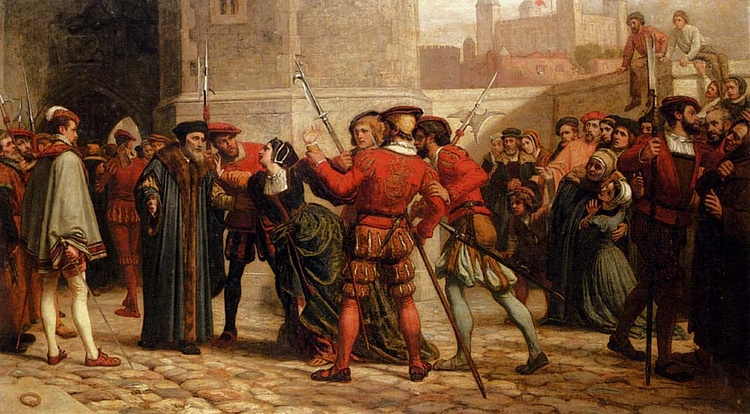
The chancellor was not in favour of the king's plans to annul his first marriage but, more particularly, he was against the king's intention to make himself head of the Church above the Pope and, in the end, it was on this point that More resigned from office. More was appalled at the king's attacks on the Church and the weakening of its independence from the monarchy, government and laymen in general. Sir Thomas then retired to private life where he would not 'study or meddle with any matter of this world' (Brigden, 119). The ex-chancellor hoped his silence on the whole issue would protect him from the king's wrath but his very silence was noted across Europe. More was succeed by Thomas Cromwell (l. c. 1485-1540 CE) who would wholeheartedly support Henry in his aims. The outgoing More had the following advice for his successor, as recorded in The Life of Sir Thomas More by More's son-in-law William Roper:
Master Cromwell you are now entered into the service of the most noble, wise and liberal prince. If you will follow my poor advice, you shall, in your counsel-giving unto his grace, the king, ever tell him what he ought to do but never what he is able to do. So shall you show yourself a true, faithful servant and a right worthy counsellor. For if a lion know his own strength, hard were it for any man to rule him. (Turvey, 114)
Trial & Imprisonment
From 1531 CE Henry and Anne were living together while Catherine was shifted about the country, confined to her residences. Sometime in December 1532 CE, Anne, perhaps seeing a baby as the best and only way to rid herself of her rival Catherine, did finally sleep with the king and she became pregnant. Thomas Cranmer, the new Archbishop of Canterbury and a man as keen as the king to split the English Church from Rome, formally annulled Henry's first marriage on 23 May 1533 CE. Parliament then passed the Act of Succession (30 April 1534 CE), which meant that Catherine's daughter Mary was declared illegitimate. In order to replace the Pope as head of the Catholic Church in England, Henry made himself head of the Church of England. This was achieved by the Act of Supremacy of 28 November 1534 CE and meant that Henry, and all subsequent English monarchs, had only one higher authority: God himself.
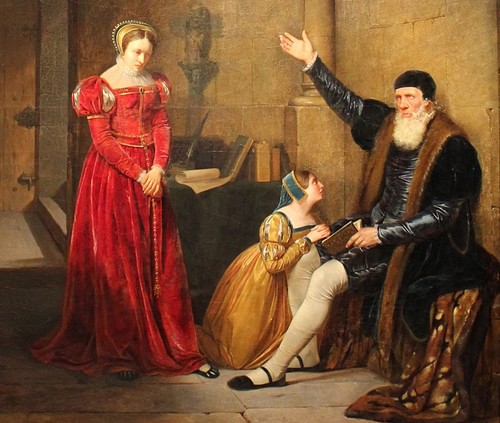
A good many subjects were keen to see reform in the Church and so continue the Protestant Reformation movement that was sweeping across Europe. Many regarded the Church as too rich and too full of priests abusing their position. Thomas More was not one of these, though. Unfortunately for More, the king would not let the matter drop, even when he had achieved his aim and married Anne Boleyn in 1533 CE; More had even refused the king's personal invitation to attend the queen's coronation. Henry well knew that his former chancellor remained an influential figure not only in England but also Europe and his distinct lack of support, even if there was no tangible opposition either, would still damage his own reputation at home and abroad. King Henry, therefore, insisted that More swear to both the Act of Succession and Oath of Supremacy. When More refused, he was taken to the Tower of London to break his resolve. When More still refused after a year of confinement, he was given an audience with Cromwell and the former chancellor gave the following robust and eloquent defence of his position:
I am the king's true, faithful subject…and daily pray for his Highness and all the realm. I do nobody harm. I say none harm. I think no harm, but wish everybody good. And if this be not enough to keep a man alive, in good faith I long not to live. And I am dying already, and I have since I came here, been several times in the case that I thought to die within one hour, and I thank our Lord I was never sorry for it but rather sorry when the pang had passed. And therefore my poor body is at the king's pleasure. Would God my death might do him some good.
(Jones, 171)
More was returned to his now-familiar prison in the Bell Tower where he was deprived of books and writing materials. With no cooperation forthcoming, More was put on trial for treason at Westminster Hall. It was, however, difficult to reach a guilty verdict when the accused insisted on remaining silent as to whether he supported the Act of Supremacy or not. The crime of treason, in English law, had to be demonstrated by a denial, not silence. Nevertheless, Thomas Cromwell managed thanks to the perjury of one of his agents Sir Richard Rich, the Solicitor-General. Rich made the highly unlikely claim that, in conversation with More while in the Tower, the latter had broken his silence and spoken of his disapproval of Henry's Act and Oath. More was, thus, found guilty and sentenced to death.
Sir Thomas More was executed on 6 July 1535 CE at Tower Hill, his last word's to the assembled onlookers being "I die the king's good servant, but God's first" (Turvey, 113). His last words to his executioner and himself were as he placed his now long grey beard carefully away from the chopping block and said that had certainly committed no treason and did not deserve to be cut. Thomas was made a saint in 1935 CE for his defence of the Catholic Church.
